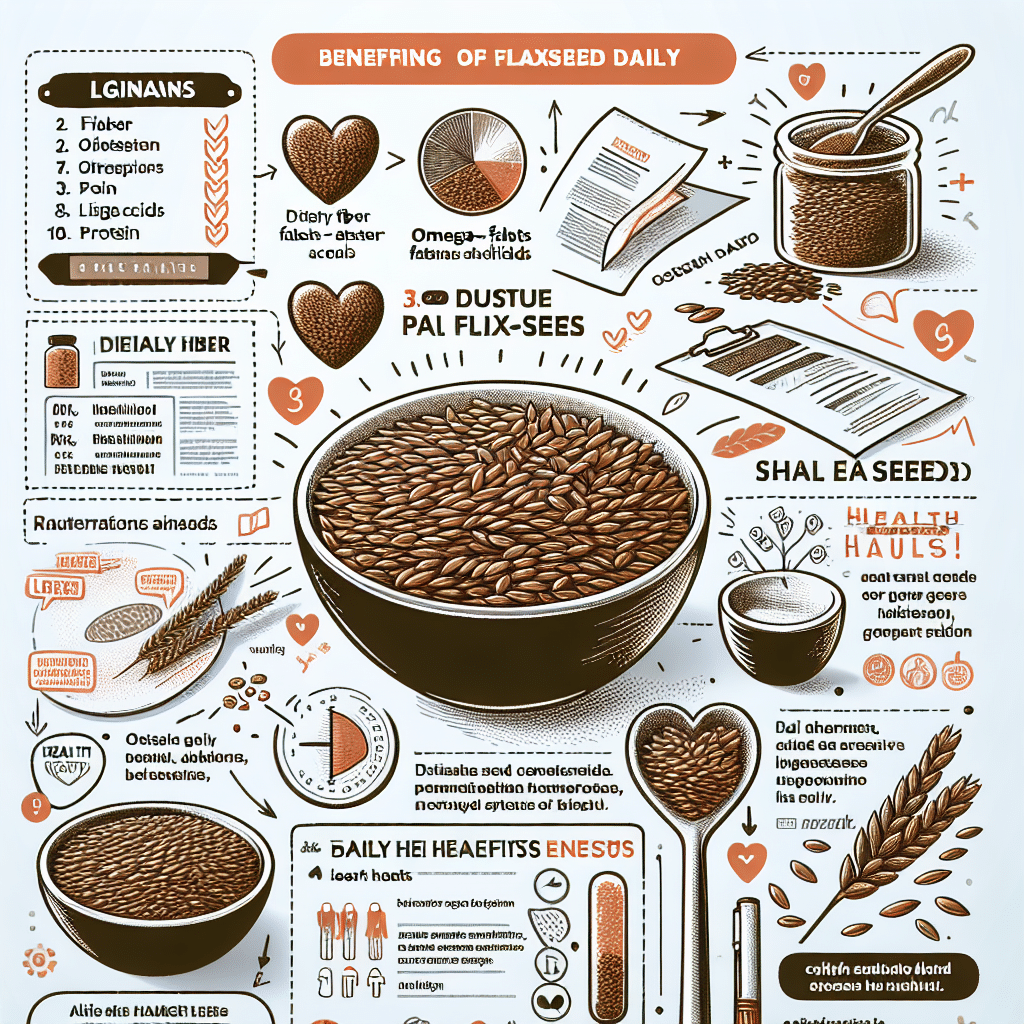Is It Good To Eat Flaxseed Everyday?
-
Table of Contents
- Flaxseed Everyday: A Healthy Habit or Too Much of a Good Thing?
- The Nutritional Profile of Flaxseed
- Health Benefits of Daily Flaxseed Intake
- Cardiovascular Health
- Digestive Health
- Anti-inflammatory and Antioxidant Effects
- Cancer Prevention
- Weight Management
- Potential Risks and Considerations
- Excessive Fiber Intake
- Interference with Medications
- Unripe or Raw Flaxseeds
- Hormone-Sensitive Conditions
- How to Incorporate Flaxseed into Your Diet
- Recommended Daily Intake
- Conclusion: Balancing Flaxseed Intake for Optimal Health
- Enhance Your Diet with ETprotein’s High-Quality Protein Products
Flaxseed Everyday: A Healthy Habit or Too Much of a Good Thing?

Flaxseed, a nutrient powerhouse, has been hailed for its numerous health benefits. Packed with fiber, omega-3 fatty acids, and lignans, these tiny seeds have been linked to improved cardiovascular health, reduced inflammation, and even cancer prevention. But as with any dietary supplement or food, the question arises: is it good to eat flaxseed every day? This article delves into the science behind flaxseed consumption and provides a comprehensive look at its benefits and potential drawbacks.
The Nutritional Profile of Flaxseed
Understanding the nutritional value of flaxseed is key to determining its role in a daily diet. Flaxseeds are rich in:
- Alpha-linolenic acid (ALA), a type of omega-3 fatty acid
- Dietary fiber, both soluble and insoluble
- Lignans, which have antioxidant and estrogen properties
- High-quality protein
- Vitamins and minerals such as vitamin B1, magnesium, and zinc
Health Benefits of Daily Flaxseed Intake
Regular consumption of flaxseed has been associated with a plethora of health benefits. Here are some of the most significant:
Cardiovascular Health
Flaxseed’s omega-3 content helps reduce blood pressure, lower cholesterol levels, and decrease the risk of heart disease. Studies have shown that ALA can reduce the risk of heart attacks and strokes.
Digestive Health
The fiber in flaxseed promotes regular bowel movements and can help prevent constipation. It also supports a healthy gut microbiome.
Anti-inflammatory and Antioxidant Effects
Lignans and omega-3 fatty acids in flaxseed have anti-inflammatory properties, which can be beneficial for conditions like arthritis. The antioxidant effects also help combat oxidative stress and may reduce the risk of various chronic diseases.
Cancer Prevention
Research suggests that flaxseed may have a protective effect against certain types of cancer, including breast, prostate, and colon cancer, due to its lignan content.
Weight Management
The high fiber content in flaxseed can help you feel full for longer, potentially aiding in weight management and obesity prevention.
Potential Risks and Considerations
While flaxseed is generally considered safe for most people, there are some potential risks and considerations to keep in mind:
Excessive Fiber Intake
Consuming too much fiber can lead to digestive discomfort, bloating, and gas. It’s important to increase fiber intake gradually and ensure adequate water consumption.
Interference with Medications
Flaxseed may interfere with certain medications, including blood thinners and blood sugar-lowering drugs. It’s crucial to consult with a healthcare provider before adding flaxseed to your diet if you are on medication.
Unripe or Raw Flaxseeds
Consuming unripe or raw flaxseeds can be harmful due to potentially toxic compounds. It’s best to consume flaxseed in its ripe, ground form.
Hormone-Sensitive Conditions
Because lignans have estrogen-like properties, individuals with hormone-sensitive conditions should consult with a healthcare professional before consuming flaxseed regularly.
How to Incorporate Flaxseed into Your Diet
Flaxseed can be easily added to your daily diet in various ways:
- Adding ground flaxseed to smoothies, yogurt, or oatmeal
- Using flaxseed oil as a salad dressing or in smoothies
- Baking with flaxseed meal as a flour substitute or an egg replacement
- Sprinkling ground flaxseed over cereal or salads
It’s important to note that ground flaxseed is more digestible than whole flaxseed and allows for better absorption of nutrients.
Recommended Daily Intake
The recommended daily intake of flaxseed varies depending on individual dietary needs and health goals. However, a general guideline is 1-2 tablespoons of ground flaxseed per day. It’s always best to start with a smaller amount and gradually increase it to avoid digestive issues.
Conclusion: Balancing Flaxseed Intake for Optimal Health
In conclusion, incorporating flaxseed into your daily diet can offer numerous health benefits, from improving heart health to aiding in digestion. However, it’s essential to consume it in moderation and be mindful of potential interactions with medications and health conditions. By understanding the nutritional profile of flaxseed and following recommended intake guidelines, you can safely enjoy the advantages of this superfood.
Enhance Your Diet with ETprotein’s High-Quality Protein Products
If you’re looking to complement your daily intake of flaxseed with high-quality protein sources, ETprotein offers a range of organic bulk vegan proteins that can fit seamlessly into your health regimen. Their products, including organic rice protein, pea protein, and various seed proteins, are non-GMO, allergen-free, and boast a neutral taste, making them an excellent addition to any diet.
For those interested in the unique benefits of L-(+)-Ergothioneine (EGT), ETprotein provides this compound in various grades suitable for nutraceutical, pharmaceutical, and cosmetic applications. EGT is known for its antioxidant properties and can support overall health and wellness.
To explore ETprotein’s offerings and how they can enhance your dietary needs, contact them at sales(at)ETprotein.com for more information or to request samples.
About ETprotein:
ETprotein, a reputable protein and L-(+)-Ergothioneine (EGT) Chinese factory manufacturer and supplier, is renowned for producing, stocking, exporting, and delivering the highest quality organic bulk vegan proteins and L-(+)-Ergothioneine. They include Organic rice protein, clear rice protein, pea protein, clear pea protein, watermelon seed protein, pumpkin seed protein, sunflower seed protein, mung bean protein, peanut protein, and L-(+)-Ergothioneine EGT Pharmaceutical grade, L-(+)-Ergothioneine EGT food grade, L-(+)-Ergothioneine EGT cosmetic grade, L-(+)-Ergothioneine EGT reference grade and L-(+)-Ergothioneine EGT standard. Their offerings, characterized by a neutral taste, non-GMO, allergen-free attributes, with L-(+)-Ergothioneine purity over 98%, 99%, cater to a diverse range of industries. They serve nutraceutical, pharmaceutical, cosmeceutical, veterinary, as well as food and beverage finished product distributors, traders, and manufacturers across Europe, USA, Canada, Australia, Thailand, Japan, Korea, Brazil, and Chile, among others.
ETprotein specialization includes exporting and delivering tailor-made protein powder and finished nutritional supplements. Their extensive product range covers sectors like Food and Beverage, Sports Nutrition, Weight Management, Dietary Supplements, Health and Wellness Products, and Infant Formula, ensuring comprehensive solutions to meet all your protein needs.
As a trusted company by leading global food and beverage brands and Fortune 500 companies, ETprotein reinforces China’s reputation in the global arena. For more information or to sample their products, please contact them and email sales(at)ETprotein.com today.












